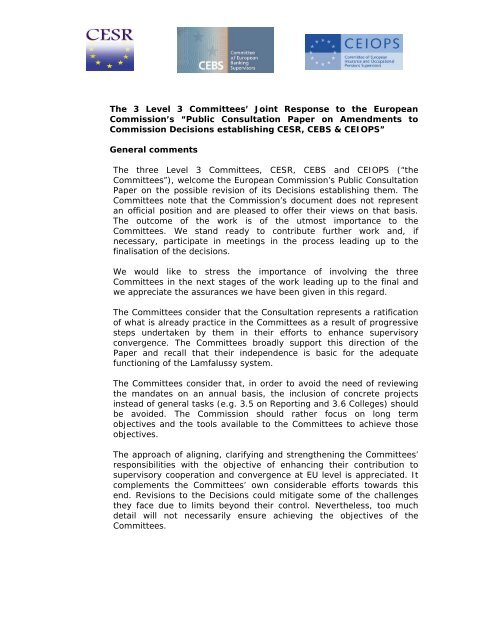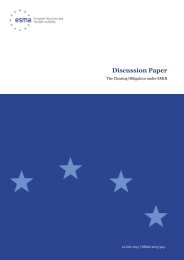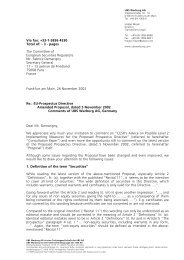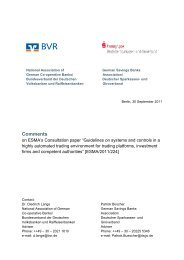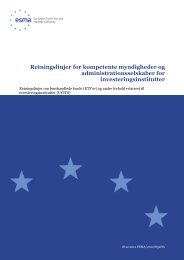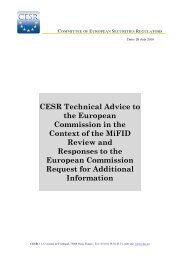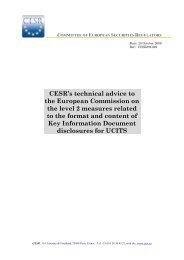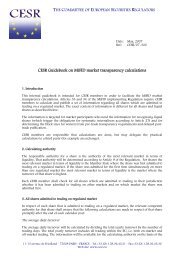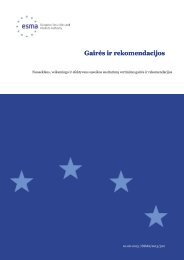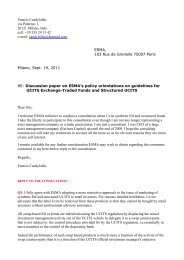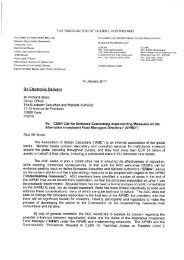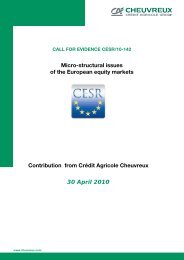The 3 Level 3 Committees' Joint Response to the European ... - Esma
The 3 Level 3 Committees' Joint Response to the European ... - Esma
The 3 Level 3 Committees' Joint Response to the European ... - Esma
Create successful ePaper yourself
Turn your PDF publications into a flip-book with our unique Google optimized e-Paper software.
<strong>The</strong> 3 <strong>Level</strong> 3 Committees’ <strong>Joint</strong> <strong>Response</strong> <strong>to</strong> <strong>the</strong> <strong>European</strong><br />
Commission’s “Public Consultation Paper on Amendments <strong>to</strong><br />
Commission Decisions establishing CESR, CEBS & CEIOPS”<br />
General comments<br />
<strong>The</strong> three <strong>Level</strong> 3 Committees, CESR, CEBS and CEIOPS (“<strong>the</strong><br />
Committees”), welcome <strong>the</strong> <strong>European</strong> Commission’s Public Consultation<br />
Paper on <strong>the</strong> possible revision of its Decisions establishing <strong>the</strong>m. <strong>The</strong><br />
Committees note that <strong>the</strong> Commission’s document does not represent<br />
an official position and are pleased <strong>to</strong> offer <strong>the</strong>ir views on that basis.<br />
<strong>The</strong> outcome of <strong>the</strong> work is of <strong>the</strong> utmost importance <strong>to</strong> <strong>the</strong><br />
Committees. We stand ready <strong>to</strong> contribute fur<strong>the</strong>r work and, if<br />
necessary, participate in meetings in <strong>the</strong> process leading up <strong>to</strong> <strong>the</strong><br />
finalisation of <strong>the</strong> decisions.<br />
We would like <strong>to</strong> stress <strong>the</strong> importance of involving <strong>the</strong> three<br />
Committees in <strong>the</strong> next stages of <strong>the</strong> work leading up <strong>to</strong> <strong>the</strong> final and<br />
we appreciate <strong>the</strong> assurances we have been given in this regard.<br />
<strong>The</strong> Committees consider that <strong>the</strong> Consultation represents a ratification<br />
of what is already practice in <strong>the</strong> Committees as a result of progressive<br />
steps undertaken by <strong>the</strong>m in <strong>the</strong>ir efforts <strong>to</strong> enhance supervisory<br />
convergence. <strong>The</strong> Committees broadly support this direction of <strong>the</strong><br />
Paper and recall that <strong>the</strong>ir independence is basic for <strong>the</strong> adequate<br />
functioning of <strong>the</strong> Lamfalussy system.<br />
<strong>The</strong> Committees consider that, in order <strong>to</strong> avoid <strong>the</strong> need of reviewing<br />
<strong>the</strong> mandates on an annual basis, <strong>the</strong> inclusion of concrete projects<br />
instead of general tasks (e.g. 3.5 on Reporting and 3.6 Colleges) should<br />
be avoided. <strong>The</strong> Commission should ra<strong>the</strong>r focus on long term<br />
objectives and <strong>the</strong> <strong>to</strong>ols available <strong>to</strong> <strong>the</strong> Committees <strong>to</strong> achieve those<br />
objectives.<br />
<strong>The</strong> approach of aligning, clarifying and streng<strong>the</strong>ning <strong>the</strong> Committees’<br />
responsibilities with <strong>the</strong> objective of enhancing <strong>the</strong>ir contribution <strong>to</strong><br />
supervisory cooperation and convergence at EU level is appreciated. It<br />
complements <strong>the</strong> Committees’ own considerable efforts <strong>to</strong>wards this<br />
end. Revisions <strong>to</strong> <strong>the</strong> Decisions could mitigate some of <strong>the</strong> challenges<br />
<strong>the</strong>y face due <strong>to</strong> limits beyond <strong>the</strong>ir control. Never<strong>the</strong>less, <strong>to</strong>o much<br />
detail will not necessarily ensure achieving <strong>the</strong> objectives of <strong>the</strong><br />
Committees.
Specific comments<br />
<strong>The</strong> Committees have contributed <strong>to</strong> many discussions on <strong>the</strong>ir roles<br />
and future. <strong>The</strong>ir positions have been set out in published documents.<br />
<strong>The</strong>y are pleased <strong>to</strong> submit summary comments on <strong>the</strong> questions in <strong>the</strong><br />
Paper, following <strong>the</strong> numbering <strong>the</strong>rein.<br />
3. SUPERVISORY COOPERATION AND CONVERGENCE<br />
3.1. Mediation<br />
Question:<br />
(i) Do you agree that voluntary and/or obliga<strong>to</strong>ry mediation can be a<br />
useful <strong>to</strong>ol <strong>to</strong> enhance <strong>the</strong> effectiveness of supervision?<br />
Comment:<br />
<strong>The</strong> Committees have developed voluntary mediation mechanisms for<br />
supervisors, with non binding decisions <strong>to</strong> provide this option. As part<br />
of <strong>the</strong> adoption process, <strong>the</strong> schemes were fully considered and<br />
endorsed by Committee Members. Never<strong>the</strong>less, obliga<strong>to</strong>ry entrance<br />
in<strong>to</strong> <strong>the</strong> existing mediation mechanism would be a step forward.<br />
Question:<br />
(ii) Do you agree that this task should be conferred <strong>to</strong> <strong>the</strong> Committees<br />
of Supervisors in <strong>the</strong> Decisions establishing <strong>the</strong>m?<br />
Comment:<br />
This could be helpful, provided that it reflects <strong>the</strong> nature of <strong>the</strong><br />
mediation mechanisms that <strong>the</strong> Committees have established, which for<br />
two of <strong>the</strong> Committees are new. Under <strong>the</strong>se mechanisms, it is not <strong>the</strong><br />
Committees <strong>the</strong>mselves but, ra<strong>the</strong>r, a media<strong>to</strong>r or panel of media<strong>to</strong>rs<br />
as appointed by a Gatekeeper who conducts <strong>the</strong> mediation.<br />
Fur<strong>the</strong>rmore, compliance with a decision is voluntary and non-binding.<br />
Also, ultimately <strong>the</strong> use made of mediation will depend on Members’<br />
perception of <strong>the</strong>ir need in <strong>the</strong> circumstances, including any alternative.<br />
3.2. Consultative role<br />
Question:<br />
(iii) Do you agree that <strong>the</strong> Committees of Supervisors should have an<br />
explicit consultative role with respect <strong>to</strong> certain decisions <strong>to</strong> be taken by<br />
supervisory authorities?<br />
Comment:<br />
Provided <strong>the</strong> competence and discretionary scope of <strong>the</strong> responsible<br />
national supervisors is safeguarded, <strong>the</strong> proposal and examples suggest<br />
2
a constructive development in <strong>the</strong> Committees’ roles, in specified<br />
situations.<br />
3.3. Information exchange<br />
Question<br />
(iv) Do you agree with <strong>the</strong> proposed role of <strong>the</strong> three Committees of<br />
Supervisors with regard <strong>to</strong> information exchange?<br />
Comment:<br />
<strong>The</strong> Committees see <strong>the</strong> proper exchange of supervisory information as<br />
fundamental <strong>to</strong> <strong>the</strong>ir functions. As <strong>the</strong> Paper mentions, <strong>the</strong>y already<br />
have existing arrangements and mechanisms in place. In addition, <strong>the</strong><br />
Financial Conglomerates Directive makes provision for exchange of<br />
information for entities covered by that Directive. <strong>The</strong> Committees<br />
combine effectiveness with o<strong>the</strong>r essential considerations, such as<br />
confidentiality. It may be desirable <strong>to</strong> reflect <strong>the</strong> relevant criteria,<br />
including clarification on <strong>the</strong> confidentiality regime applicable <strong>to</strong> <strong>the</strong><br />
Committees’ Secretariats, in any Decisions mandate.<br />
3.4. Delegation of tasks and responsibilities<br />
Question<br />
(v) Do you agree that <strong>the</strong> Committees of Supervisors should as a<br />
priority have a role <strong>to</strong> foster delegation of tasks between national<br />
supervisors?<br />
Comment:<br />
<strong>The</strong> Committees have generally tended <strong>to</strong> support <strong>the</strong> principle of<br />
voluntary delegation of tasks, as part of <strong>the</strong>ir ‘Home – Host’ sec<strong>to</strong>r and<br />
joint work. Voluntary delegation of tasks can improve substantially <strong>the</strong><br />
positive effects of cooperation, streng<strong>the</strong>ning mutual trust among<br />
supervisors, while avoiding moral hazard <strong>The</strong> proposal could be<br />
contentious for some Committee Members, in certain applications. A<br />
new <strong>Joint</strong> 3 <strong>Level</strong> 3 Task Force is being established <strong>to</strong> analyse <strong>the</strong><br />
issue. It will develop legal and some operational issues. It foresees<br />
easier scope for delegation of supervisory tasks than for<br />
responsibilities, for which ad hoc legal provisions –outside <strong>the</strong> scope<br />
and powers of <strong>the</strong> Committees- might be necessary.<br />
(vi) Do you consider that delegation of responsibilities should also be<br />
regarded as a priority? If so, what could be <strong>the</strong> role of <strong>the</strong> Committees<br />
of Supervisors in this respect?<br />
Comment: Except in very specific existing cases (e.g. under <strong>the</strong><br />
Prospectus Directive), delegation of responsibilities is mainly seen by<br />
<strong>the</strong> Committees as a much longer term possibility. Whilst delegation<br />
should be built mainly on mutual trust among supervisors, <strong>the</strong>re are<br />
3
numerous obstacles in <strong>the</strong> current legal framework that would need <strong>to</strong><br />
be addressed, as a matter of priority, at <strong>Level</strong> 1.<br />
3.5. Streamlining reporting requirements<br />
Question<br />
(vii) Do you agree with <strong>the</strong> proposed role of <strong>the</strong> three Committees of<br />
Supervisors with regard <strong>to</strong> streamlining of reporting requirements?<br />
Comment:<br />
Within <strong>the</strong> Committees’ remit of supervisory reporting and disclosure<br />
requirements, <strong>the</strong>y have continued <strong>the</strong>ir drive <strong>to</strong>wards common<br />
formats. Certain sec<strong>to</strong>r programmes with timetables and product<br />
results, have been agreed.<br />
3.6. Colleges of supervisors<br />
Question<br />
(viii) Do you agree with <strong>the</strong> proposed role of <strong>the</strong> three Committees of<br />
Supervisors with regard <strong>to</strong> colleges or similar arrangements?<br />
Comment: As <strong>the</strong> Paper indicates, colleges of supervisors are primarily<br />
matters concerning CEBS and CEIOPS, and <strong>the</strong>ir Interim Working Committee<br />
on Financial Conglomerates, whilst CESR works on similar arrangements<br />
within MiFID. <strong>The</strong>ir joint and sec<strong>to</strong>r work is highly developed. <strong>The</strong> Commission<br />
is aware of this from its observership in <strong>the</strong> Committees.<br />
3.7. Development of a common supervisory culture<br />
Question<br />
(ix) Do you agree with <strong>the</strong> proposed role of <strong>the</strong> three Committees of<br />
Supervisors <strong>to</strong> develop a common <strong>European</strong> culture? If yes, what are<br />
<strong>the</strong> most important <strong>to</strong>ols <strong>to</strong> meet this objective?<br />
Comment: <strong>The</strong> Committees wholly support this statement of <strong>the</strong>ir role.<br />
In addition <strong>to</strong> <strong>the</strong> individual <strong>to</strong>ols mentioned, <strong>the</strong> intensity and diversity<br />
of supervisors regularly working <strong>to</strong>ge<strong>the</strong>r in <strong>the</strong> Committees is one of<br />
<strong>the</strong> most significant influences. Fostering and supporting <strong>the</strong>ir ability <strong>to</strong><br />
continue with that work will fur<strong>the</strong>r help <strong>to</strong> achieve this objective.<br />
Exploring extension of <strong>the</strong>ir mutual exchanges of personnel and<br />
common training programmes <strong>to</strong> third countries is a potential longerterm<br />
proposition <strong>to</strong> encourage. It could be helpfully added <strong>to</strong> present<br />
discussions on EU funding for <strong>the</strong> Committees’ training programmes.<br />
3.8. Cross-sec<strong>to</strong>ral cooperation<br />
Questions<br />
4
(x) Do you agree with <strong>the</strong> need <strong>to</strong> provide a general framework for joint<br />
3L3 work in <strong>the</strong> Commission Decisions establishing <strong>the</strong> Committees of<br />
Supervisors?<br />
(xi) Should <strong>the</strong> obligation and responsibility for 3L3 cooperation and<br />
coordination be spelled out in a more detailed way? If so, what are <strong>the</strong><br />
specific obligations and responsibilities <strong>the</strong> Committees of Supervisors<br />
should be assigned in this respect?<br />
(xii) Do you agree with <strong>the</strong> approach suggested for <strong>the</strong> supervision of<br />
financial conglomerates?<br />
Comment: <strong>The</strong> Committees can comment on <strong>the</strong> questions <strong>to</strong>ge<strong>the</strong>r,<br />
by stating that <strong>the</strong>y consider <strong>the</strong> summary and proposals right, both in<br />
<strong>the</strong>ir balance and in <strong>the</strong>ir approach. <strong>The</strong>y would be assisted by <strong>the</strong><br />
Decisions specifications and re-titling of <strong>the</strong> ‘IWCFC’ in <strong>the</strong> manner<br />
suggested.<br />
3.9. Qualified Majority Voting<br />
Question<br />
(xiii) Do you consider that <strong>the</strong> Committees of Supervisors should be<br />
requested in <strong>the</strong> Decisions <strong>to</strong> take decisions by qualified majority, with<br />
a "comply and explain" procedure?<br />
Comment: In a follow-up <strong>to</strong> <strong>the</strong> Paper, <strong>the</strong> Committees have<br />
introduced, or at <strong>the</strong> time of this <strong>Response</strong> are introducing, Qualified<br />
Majority Voting (QMV) and a “comply or explain” procedure in<strong>to</strong> <strong>the</strong>ir<br />
Charters. However, <strong>the</strong> decisions would remain legally non-binding.<br />
Committee decisions should, in <strong>the</strong> first instance, aim <strong>to</strong> be made by<br />
consensus. QMV may <strong>the</strong>n be deployed where that would not be<br />
possible. <strong>The</strong> Committees’ new provisions, with only slight differences<br />
in text, could well be served by reflection in <strong>the</strong> Decisions, in case <strong>the</strong><br />
Commission deems necessary <strong>to</strong> insert such specific issue, already<br />
dealt with by <strong>the</strong> Committees in <strong>the</strong>ir charters.<br />
3.10. Annual Work-Programmes of <strong>the</strong> Committees of<br />
Supervisors<br />
Question<br />
(xiv) Do you consider that <strong>the</strong> request <strong>to</strong> <strong>the</strong> Committees of<br />
Supervisors <strong>to</strong> submit <strong>the</strong>ir annual work-programmes <strong>to</strong> <strong>the</strong> ECOFIN<br />
Council, <strong>the</strong> <strong>European</strong> Parliament and <strong>the</strong> Commission should be<br />
included in <strong>the</strong> Decisions?<br />
Comment: <strong>The</strong> Committees have targeted <strong>the</strong> production stages of<br />
<strong>the</strong>ir 2009 draft work programmes, <strong>to</strong> be ready for transmission <strong>to</strong> <strong>the</strong><br />
<strong>European</strong> Institutions for <strong>the</strong>ir views in November 2008. <strong>The</strong>y would be<br />
assisted by early Institutional reactions, <strong>to</strong> be able <strong>to</strong> timely reflect on<br />
<strong>the</strong>se reactions when finalising <strong>the</strong>ir respective work programmes, <strong>to</strong><br />
be approved by <strong>the</strong>ir Members. Revision of <strong>the</strong> Decisions could<br />
5
encourage this. In presenting any work programmes <strong>the</strong> Committees<br />
will put forward <strong>the</strong>ir key priorities ra<strong>the</strong>r than <strong>the</strong> detailed content of<br />
<strong>the</strong> actions <strong>to</strong> be undertaken.<br />
4. FINANCIAL STABILITY<br />
Question<br />
(xv) Do you agree with <strong>the</strong> proposed role of <strong>the</strong> three Committees of<br />
Supervisors?<br />
(xvi) Are additional efforts needed <strong>to</strong> streng<strong>the</strong>ning risk analysis and<br />
responsiveness at <strong>the</strong> EU level? If so, please specify <strong>the</strong>se efforts.<br />
Comment: <strong>The</strong> Committees continue <strong>to</strong> stand ready <strong>to</strong> provide reports<br />
and supervisory expertise where, and in forms, appropriate <strong>to</strong> <strong>the</strong>m. In<br />
order <strong>to</strong> do so in an efficient manner <strong>the</strong> Committees will, as already<br />
agreed, provide regular Reports (twice a year), complemented by<br />
qualitative assessments of risks more frequently if necessary. <strong>The</strong><br />
Committees would be helped by division of tasks and responsibilities,<br />
which could distinguish <strong>the</strong>ir supervisory functions from, for example,<br />
in-depth ongoing data retrieval and processing for early warning<br />
systems, which is done by o<strong>the</strong>r institutions.<br />
<strong>The</strong> Committees consider it preferable <strong>to</strong> include a broad reference <strong>to</strong><br />
Financial Stability in <strong>the</strong>ir mandates ra<strong>the</strong>r than detailed requirements.<br />
6


